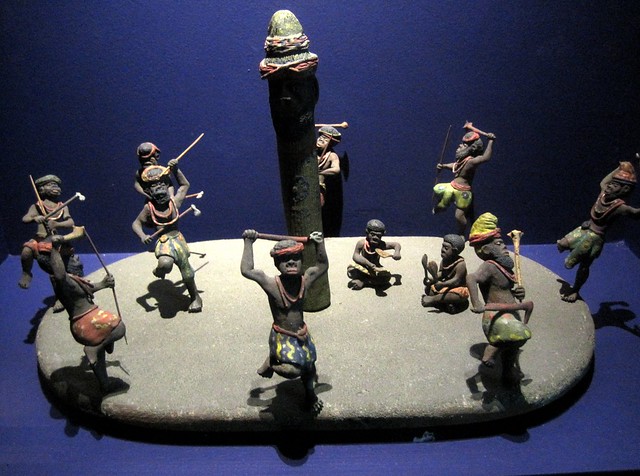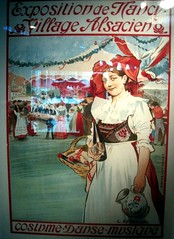Concerning cramped Parisian apartments, Merritt Symes, Dominic Pettman's wife, remarked that she feels gigantic. Here, the sinks, the lights and all the other household amenities are too close to one another. I feel like she does in this Hobbit-Town. We have outsized hands and bodies. We move, we destroy. The Potiche, though, pretends that she has a perfect lightness, but no one, not even the Potiche, has such little hands.
Not long ago, la Potiche and le Prof visited the Museum of the Quai Branly and saw the show "The Invention of the Savage." La Potiche said to me that she had never seen such a beautiful collection of horrible objects. She has other ideas, below, in the comments. For my part, I wish that the show had as much on interior colonialism as it did on foreign imperialism. The invention of the savage and the invention of France fed each other. Moreover, for Paris, even France was a foreign country.
Here you go, a poster that satisfies me:
It seems to me that Paris also wondered at wooden shoes and Breton head-dresses.
There are more fundamental problems for museums as a whole. It seemed to us that the show condemned colonial ideas and, at the same time, reveled in them. This is a touchy problem for museums: we visit them like tourists; we amuse ourselves; and no matter what horror we see there, we have the pleasure of leisure in them. To see correctly, to make museums more serious, we need more pleasure in our own lives.
A rather silly remark: at the Cluny museum, we saw the show "Gaston Febus (1331-1391) - Sun Prince." I really liked it, but where was his spirit adviser, Orton? Cluny told us stories of hunting and filicide--thanks!--but if a very powerful man has a spectral friend...
One more thing: I am slowly reading The Roads of Paris (1844): the roads before Haussmann! I'm losing myself in it/them. This book is a true treasure. You, reader of Foucault, you know the story of the unspeakable end of Robert-François Damiens. Here are the words of Eugène Briffault on this subject:
Au sujet de l'exiguïté des appartements parisiens, Merritt Symes, la femme de Dominic Pettman, a fait remarquer qu'elle se sent gigantesque. Ici, les éviers, les lumières et toutes les autres installations sont trop près l'un de l'autre. Je me sens comme elle dans cette ville hobbitesque. Nous avons les mains et les corps démesurés. On déplace, on détruit. La Potiche, elle prétend qu'elle ait une légèreté parfaite, mais personne, même pas la Potiche, n’a de si petites mains.
Il n'y a pas longtemps la Potiche et le Prof ont visité le musée du Quai Branly et ont vu l'exposition « L’invention du sauvage. » La Potiche m'a dit qu'il eût la plus belle collection des objets horribles qu'elle n'ait jamais vus. Elle a des autres idées, en bas, dans les commentaires. Moi, je souhaitais que l'exposition exposait le colonialisme intérieur autant qu'il exposait l’impérialisme étranger. L'invention du sauvage et l'invention de la France se nourrissaient l'un et l'autre. De plus, à Paris, même la France était un pays étranger. Voilà, un poster que me satisfait ; il me semble que la Paris s'émerveillait aussi des sabots et des coiffes bretonnes.
Pour les musées, il y a des problèmes plus fondamentaux. Il nous semblait que l'exhibition condamnait les idées colonialistes et conjointement se délectait d'elles. C'est un problème délicat pour les musées : on les visite comme touristes ; on s'amuse ; n'importe quelle horreur on y voit, on y a le plaisir de loisir. De voir correctement, de rendre les musées plus serieux, nous avons besoin de plus de plaisir dans nos propres vies.
Une remarque assez frivole : au Muśee Cluny, nous avons vu l'exposition "Gaston Fébus (1331-1391) - Prince Soleil.” Moi, je l'ai adoré, mais où était son fantôme conseiller, Orton? Cluny nous a raconté les histoires de la chasse et filicide—merci!—mais si un homme très fort avait un ami spectral...
Une chose plus : je lentement lis Les Rues de Paris (1844) : les rues avant Haussmann! Je m'y perds. Ce livre est un vrai trésor. Vous, une lectrice de Foucault, vous savez l'histoire de la fin épouvantable de Robert-François Damiens. Voilà les mots de Eugène Briffault au ce sujet:
It seems to me that Paris also wondered at wooden shoes and Breton head-dresses.
There are more fundamental problems for museums as a whole. It seemed to us that the show condemned colonial ideas and, at the same time, reveled in them. This is a touchy problem for museums: we visit them like tourists; we amuse ourselves; and no matter what horror we see there, we have the pleasure of leisure in them. To see correctly, to make museums more serious, we need more pleasure in our own lives.
A rather silly remark: at the Cluny museum, we saw the show "Gaston Febus (1331-1391) - Sun Prince." I really liked it, but where was his spirit adviser, Orton? Cluny told us stories of hunting and filicide--thanks!--but if a very powerful man has a spectral friend...
One more thing: I am slowly reading The Roads of Paris (1844): the roads before Haussmann! I'm losing myself in it/them. This book is a true treasure. You, reader of Foucault, you know the story of the unspeakable end of Robert-François Damiens. Here are the words of Eugène Briffault on this subject:
Regardless of these grand traditions, the deeds that we just recounted will be a kind of monument to abominable cruelty: they occurred in the era where the French nation prided itself on being the most polished of all. The Era of Louis XIV followed the birth of the philosophy that began to enlighten the world, and it was in this light, before such a people, that we displayed this splendid [or tawdry] ferocity!
Au sujet de l'exiguïté des appartements parisiens, Merritt Symes, la femme de Dominic Pettman, a fait remarquer qu'elle se sent gigantesque. Ici, les éviers, les lumières et toutes les autres installations sont trop près l'un de l'autre. Je me sens comme elle dans cette ville hobbitesque. Nous avons les mains et les corps démesurés. On déplace, on détruit. La Potiche, elle prétend qu'elle ait une légèreté parfaite, mais personne, même pas la Potiche, n’a de si petites mains.
Il n'y a pas longtemps la Potiche et le Prof ont visité le musée du Quai Branly et ont vu l'exposition « L’invention du sauvage. » La Potiche m'a dit qu'il eût la plus belle collection des objets horribles qu'elle n'ait jamais vus. Elle a des autres idées, en bas, dans les commentaires. Moi, je souhaitais que l'exposition exposait le colonialisme intérieur autant qu'il exposait l’impérialisme étranger. L'invention du sauvage et l'invention de la France se nourrissaient l'un et l'autre. De plus, à Paris, même la France était un pays étranger. Voilà, un poster que me satisfait ; il me semble que la Paris s'émerveillait aussi des sabots et des coiffes bretonnes.
Pour les musées, il y a des problèmes plus fondamentaux. Il nous semblait que l'exhibition condamnait les idées colonialistes et conjointement se délectait d'elles. C'est un problème délicat pour les musées : on les visite comme touristes ; on s'amuse ; n'importe quelle horreur on y voit, on y a le plaisir de loisir. De voir correctement, de rendre les musées plus serieux, nous avons besoin de plus de plaisir dans nos propres vies.
Une remarque assez frivole : au Muśee Cluny, nous avons vu l'exposition "Gaston Fébus (1331-1391) - Prince Soleil.” Moi, je l'ai adoré, mais où était son fantôme conseiller, Orton? Cluny nous a raconté les histoires de la chasse et filicide—merci!—mais si un homme très fort avait un ami spectral...
Une chose plus : je lentement lis Les Rues de Paris (1844) : les rues avant Haussmann! Je m'y perds. Ce livre est un vrai trésor. Vous, une lectrice de Foucault, vous savez l'histoire de la fin épouvantable de Robert-François Damiens. Voilà les mots de Eugène Briffault au ce sujet:
Malgré ces formidables traditions, les actes que nous venons de rappeler resteront comme un monument d'abominable cruauté; ils se passaient à l'époque où la nation française se vantait d'être la plus polie de l'univers. Au siècle de Louis XIV succédait l'avènement de cette philosophie qui entreprit d'éclairer le monde, et c'était à ces clartés, a la face de tout un peuple, qu'on déployait ce faste de férocité!


again, the English is weird because I'm writing (badly!) in French first. Here I am, continue to conduct my education in public.
ReplyDeleteand needless to say I'm not 100% sure of my translation from the 1844 book...
ReplyDelete